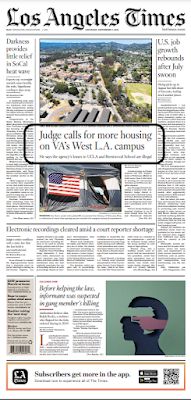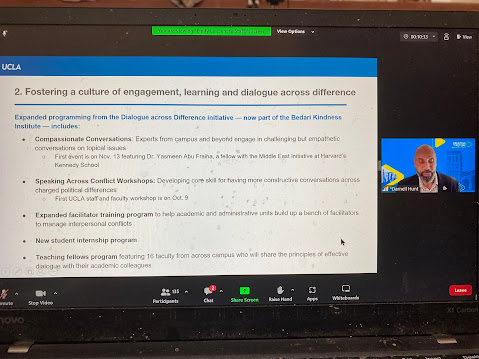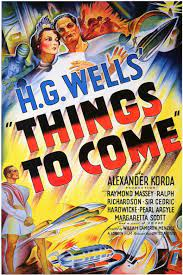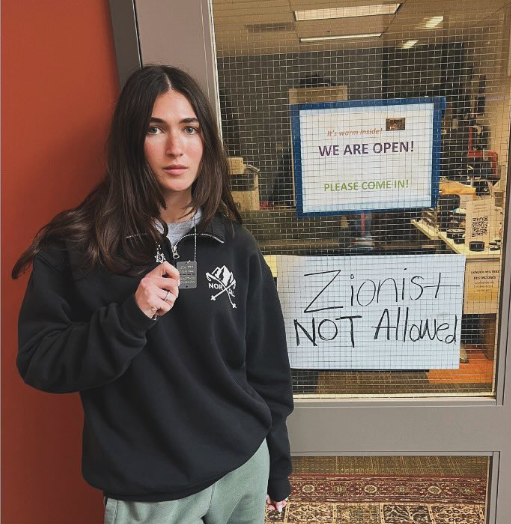From the
Mercury News:
Ten protesters will face misdemeanor charges in connection with a May 15 pro-Palestinian protest at UCI that police declared an unlawful assembly, the Orange County District Attorney’s Office said Wednesday. They were charged with failure to disperse at the scene of a riot, while two also were charged with resisting arrest, prosecutors said.The defendants include an associate professor, a lecturer and four UCI students, according to information released by prosecutors. The ties of the remaining four defendants to UCI, if any, were not immediately clear. All 10 were ordered to appear in court on Oct. 16, DA officials said.
Prosecutors are still reviewing potential evidence related to another several dozen who were arrested during the May 15 protest.
In a statement Wednesday, UCI officials wrote that the university “has a long history of supporting free speech and peaceful protest,” but added that “all members of the UC Irvine community remain subject to all applicable laws, policies, and relevant codes of conduct while engaging in protest activities …
“As part of ongoing efforts across the University of California system, UC Irvine is clearly communicating with all members of the university community regarding campus policies, their enforcement, and the balance between free expression and campus safety,” the statement read.
Those charged with the single failure to disperse charge will likely be eligible for a court diversion program rather than face time behind bars, prosecutors confirmed. But it wasn’t immediately clear what impact, if any, the charges will have on the status of those who are current UC Irvine faculty or students. UC Irvine officials did not respond to direct questions about whether criminal charges or a conviction could jeopardize any of their academic careers...
Full story at https://www.mercurynews.com/2024/09/19/10-protesters-tied-to-pro-palestinian-demonstration-at-uci-in-may-now-face-misdemeanor-charges/.
===
You may have noted that the various Faculty Associations have filed a complaint with PERB concerning matters related to recent protests. None of the associations have contracts with UC.* Only Santa Cruz ever achieved representation rights and it appears that there have been no contracts there for over two decades. So it may seem surprising that a complaint could be filed with PERB. However, state labor law is largely taken from federal private-sector law which protects "concerted activity" of workers, whether unionized or not. Concerted activity mainly means some collection of employees pursuing some goal related to wages, hours, or working conditions.
However, labor law has evolved to recognize management rights, things like deciding what products or services to produce. There is also a tendency of agencies such as PERB to defer to internal processes such as contractual grievance procedures. The associations don't have contracts so there are no contractual grievance procedures. But there are various mechanisms in the Academic Senate. PERB might well prefer that Senate mechanisms be used. This is in part a practical issue. Does PERB really want to entangle itself into the nitty gritty of deciding whether the concept of academic freedom, for example, prevents the UC administration from saying faculty can't use classes for "indoctrination"? And then the nitty gritty of definiing what that means? PERB might well look at teaching as a service UC delivers and view regulation of such teaching as a management right. To the extent UC and the Regents have delegated interpreting that right in the context of academic freedom to the Senate, the Senate might be viewed as the place to adjudicate what that means.
The case of the UAW, which does have a contractual relationship with UC, is somewhat different. But what PERB will be looking at is whether the grievance process included in the various contracts is the proper forum for determining issues that arise during the life of the contracts. Whether engaging in protests about foreign policy can be viewed as a working condition is another issue, but again, it's something that could potentially involve PERB in inserting itself into the basic operation of UC, i.e., something PERB - as a practical matter - might want to avoid.
Finally, marching through the mechanisms and levels of PERB and then potentially through the courts will take time.
===
*The PERB filings are at:
https://ia600402.us.archive.org/9/items/2-final-hjaa-report.-the-soil-beneath-the-encampments/UCLA-FA-ULP%206-3-24.pdf; and
https://ia600402.us.archive.org/9/items/2-final-hjaa-report.-the-soil-beneath-the-encampments/FA%20PERB%20ULP%20charge%209-19-2024.pdf.










































